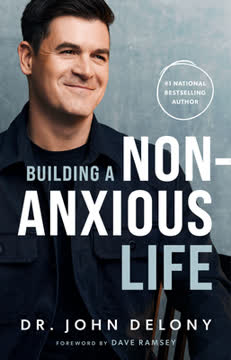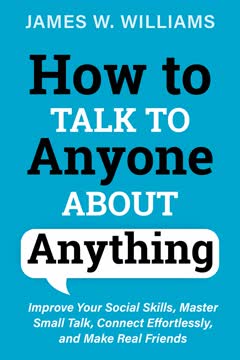نکات کلیدی
1. حس خود را پرورش دهید تا روابط واقعی بسازید
"حس خودتان همه چیز است. این شما را تعریف میکند."
خودآگاهی بنیادی است. درک باورها، ارزشها و هدفهای زندگیتان برای ارتباطات واقعی بسیار مهم است. بدون حس قوی از خود، ممکن است در زندگی سرگردان و بیتصمیم باشید. برای پرورش خودآگاهی:
- به ارزشها، علایق و اهداف خود فکر کنید
- نقاط قوت و زمینههای نیاز به بهبود خود را شناسایی کنید
- در نظر بگیرید که چگونه میخواهید توسط دیگران دیده شوید
اصالت ارتباط را تقویت میکند. وقتی خود را بشناسید، میتوانید با اطمینان نظرات خود را به اشتراک بگذارید و در گفتگوهای معنادار شرکت کنید. این اصالت به دیگران اجازه میدهد تا با شما به عنوان یک فرد واقعی ارتباط برقرار کنند و روابط عمیقتری را ایجاد کنند.
2. هنر گوش دادن فعال را برای ارتباطات عمیقتر تسلط پیدا کنید
"وقتی صحبت میکنید، فقط آنچه را که قبلاً میدانید تکرار میکنید. اما اگر گوش دهید، ممکن است چیز جدیدی یاد بگیرید." — دالایی لاما
گوش دادن یک مهارت است که باید پرورش یابد. گوش دادن فعال شامل توجه کامل به گوینده، درک پیام او و پاسخدهی با تفکر است. برای بهبود مهارتهای گوش دادن خود:
- حواسپرتیها را کاهش دهید و بر روی گوینده تمرکز کنید
- با او تماس چشمی برقرار کنید و از زبان بدن باز استفاده کنید
- از قطع کردن صحبت دیگران یا برنامهریزی برای پاسخ خود در حین صحبت کردن آنها خودداری کنید
همدلی درک را افزایش میدهد. با گوش دادن واقعی، وضوح بیشتری در مورد آنچه دیگران میگویند و احساس میکنند به دست میآورید. این درک عمیقتر به شما اجازه میدهد تا به طور مؤثرتری پاسخ دهید و ارتباطات قویتری بسازید.
3. سوالات قدرتمند بپرسید تا گفتگوها را هدایت کنید
"در پایان روز، سوالاتی که از خود میپرسیم نوع افرادی را که خواهیم شد تعیین میکند." — لئو باباوتا
سوالات گفتگوها را شکل میدهند. سوالات درست میتوانند یک گفتوگو را هدایت کنند، زمینههای مشترک را کشف کنند و فرصتهایی برای ارتباط عمیقتر ایجاد کنند. برای پرسیدن سوالات بهتر:
- از سوالات باز استفاده کنید تا تشویق به توضیح بیشتر کنید
- بر روی علایق و تجربیات شخص دیگر تمرکز کنید
- از پرسیدن سوالات قضاوتآمیز یا بیش از حد شخصی در اوایل یک رابطه خودداری کنید
کنجکاوی تعامل را تقویت میکند. نشان دادن علاقه واقعی به دیگران از طریق سوالات فکرشده، آنها را ارزشمند و درکشده احساس میکند. این کنجکاوی میتواند به تعاملات معنادار و به یادماندنی منجر شود.
4. گفتگوهای سطحی را به دیالوگهای جذاب تبدیل کنید
"گفتگوهای سطحی بزرگترین گفتوگوهایی هستند که ما انجام میدهیم." — سوزان روآن
گفتگوهای سطحی یک دروازه هستند. در حالی که اغلب به عنوان سطحی تلقی میشوند، گفتگوهای سطحی به عنوان یک روانکننده اجتماعی مهم و نقطه ورود برای گفتگوهای عمیقتر عمل میکنند. برای ارتقاء گفتگوهای سطحی:
- با موضوعات مشترک مانند محیط اطراف یا تجربیات مشترک شروع کنید
- به دنبال فرصتهایی برای انتقال به موضوعات عمیقتر باشید
- در گفتگو نشان دهید که به آنچه میگویید علاقهمند و مشتاق هستید
به تدریج رابطه بسازید. روابط معنادار زمان میطلبند. از گفتگوهای سطحی به عنوان پایهای برای ایجاد اعتماد و یافتن زمینههای مشترک استفاده کنید قبل از اینکه به موضوعات شخصی یا پیچیدهتر بپردازید.
5. از طریق اشتیاق و انرژی واقعی، کاریزما را پرورش دهید
"کاریزما در مردم درخشش خاصی است که پول نمیتواند بخرد. این یک انرژی نامرئی با اثرات قابل مشاهده است." — ماریان ویلیامسون
اشتیاق مسری است. آوردن انرژی مثبت و علاقه واقعی به تعاملات شما میتواند شما را جذابتر و به یادماندنیتر کند. برای پرورش کاریزما:
- برای موضوعاتی که به آنها علاقه دارید، اشتیاق خود را ابراز کنید
- از زبان بدن پرانرژی و تنوع صوتی استفاده کنید
- بر روی مهم بودن و ارزشمند بودن دیگران تمرکز کنید
اصالت بر کمال ارجحیت دارد. کاریزمای واقعی از بودن خودتان ناشی میشود، نه از تلاش برای تقلید از دیگران. ویژگیهای منحصر به فرد خود را بپذیرید و اجازه دهید شخصیت واقعیتان درخشش پیدا کند.
6. از طریق زبان بدن و تغییرات ذهنی، اعتماد به نفس بسازید
"زیباترین چیزی که میتوانید بپوشید، اعتماد به نفس است." — بلیک لایولی
زبان بدن بسیار گویا است. نشانههای غیرکلامی شما میتوانند تأثیر زیادی بر نحوه درک دیگران از شما و همچنین احساس شما نسبت به خودتان داشته باشند. برای نشان دادن اعتماد به نفس:
- با قامت راست بایستید
- تماس چشمی مناسب برقرار کنید
- از حرکات باز استفاده کنید و از حالتهای تدافعی خودداری کنید
ذهنیت مهم است. اعتماد به نفس به اندازهای که خارجی است، داخلی نیز هست. برای ساختن اعتماد به نفس درونی:
- با گفتوگوهای منفی با خود مبارزه کنید
- نقاط قوت و دستاوردهای خود را جشن بگیرید
- خود را با محبت بپذیرید و نقصها را در آغوش بگیرید
7. داستانهای جذاب بسازید تا تأثیر ماندگاری بگذارید
"درون هر یک از ما یک داستانگوی طبیعی وجود دارد که منتظر آزاد شدن است." — رابین مور
داستانها ارتباط ایجاد میکنند. داستانهای خوب روایت شده میتوانند مخاطبان را مجذوب کنند، پیامهای مهمی را منتقل کنند و شما را به یاد ماندنیتر کنند. برای بهبود داستانگویی خود:
- داستانهای خود را با یک شروع، میانه و پایان واضح ساختاربندی کنید
- جزئیات و احساسات زنده را برای زنده کردن داستانهای خود بگنجانید
- داستانهای خود را تمرین کنید تا نحوه بیان آنها را بهبود بخشید
در زندگی روزمره داستانها را پیدا کنید. برای گفتن داستانهای عالی نیازی به تجربیات فوقالعاده نیست. به دنبال لحظات جالب در زندگی روزمرهتان باشید و آنها را به شیوههای جذاب بیان کنید.
8. افقهای خود را گسترش دهید تا فردی جالبتر شوید
"زندگی شما بوم شماست و شما شاهکار آن هستید. میلیونها راه برای مهربانی، شگفتانگیز بودن، فوقالعاده بودن، خلاق بودن، جسور بودن و جالب بودن وجود دارد." — کرلی
کنجکاوی علاقه را پرورش میدهد. به طور فعال جستجوی تجربیات و دانش جدید شما را به یک گفتوگوکننده جذابتر و فردی جالبتر تبدیل میکند. برای گسترش افقهای خود:
- به طور گسترده در موضوعات مختلف مطالعه کنید
- به فعالیتها یا سرگرمیهای جدید بپردازید
- سفر کنید و خود را در معرض فرهنگهای مختلف قرار دهید
در رشد شخصی سرمایهگذاری کنید. یادگیری مداوم و به چالش کشیدن خود نه تنها شما را جالبتر میکند بلکه به زندگیای پربارتر منجر میشود. برای توسعه شخصی اهدافی تعیین کنید و با اشتیاق به دنبال آنها بروید.
آخرین بهروزرسانی::
FAQ
1. What is "How to Talk to Anyone About Anything" by James W. Williams about?
- Comprehensive Social Skills Guide: The book is a practical guide to improving social skills, mastering small talk, connecting effortlessly, and making real friends.
- Step-by-Step Approach: It covers everything from building self-confidence and understanding yourself to advanced conversation techniques and relationship-building.
- Actionable Advice: The author provides exercises, real-life examples, and actionable tips to help readers practice and implement the skills discussed.
- Focus on Connection: The central theme is that meaningful relationships and effective communication are essential for happiness and success.
2. Why should I read "How to Talk to Anyone About Anything" by James W. Williams?
- Overcome Social Anxiety: The book is ideal for anyone who feels shy, awkward, or anxious in social situations and wants to become more confident.
- Practical, Real-World Tips: It offers actionable strategies that can be applied immediately in everyday life, from work to dating to making new friends.
- Personal Growth: The author shares his own journey from social anxiety to social confidence, making the advice relatable and encouraging.
- Universal Relevance: Whether you want to improve your professional networking, deepen friendships, or simply feel more at ease in conversations, the book provides tools for all scenarios.
3. What are the key takeaways from "How to Talk to Anyone About Anything" by James W. Williams?
- Self-Awareness is Foundational: Developing a strong sense of self and understanding your values is the first step to confident communication.
- Listening is Crucial: Active, empathetic listening is more important than speaking and is the basis for all meaningful conversations.
- Questions Drive Connection: Asking open-ended, thoughtful questions is the best way to guide conversations and build rapport.
- Practice Makes Perfect: Social skills, like any other, require consistent practice, self-reflection, and a willingness to step out of your comfort zone.
4. How does James W. Williams define and develop a "sense of self" in "How to Talk to Anyone About Anything"?
- Beyond Surface Identity: Williams encourages readers to look past basic identifiers (name, job, age) and explore deeper beliefs, values, and passions.
- Self-Reflection Exercises: The book provides journaling prompts and questions to help readers clarify who they are and what they want.
- Authenticity is Key: A well-developed sense of self allows you to be authentic in interactions, which naturally boosts confidence and connection.
- Continuous Process: Developing your sense of self is ongoing and evolves with new experiences and self-discovery.
5. What listening skills and techniques are emphasized in "How to Talk to Anyone About Anything" by James W. Williams?
- Active Listening: Focus on listening to understand, not just to respond, by giving your full attention and minimizing distractions.
- Body Language Matters: Use eye contact, open posture, and nodding to show engagement and encourage openness.
- Clarification and Reflection: Repeat back key points, paraphrase, and ask clarifying questions to ensure understanding and make the speaker feel heard.
- Non-Judgmental Attitude: Avoid making judgments or interrupting, and strive to be open-minded and accepting of different perspectives.
6. How does "How to Talk to Anyone About Anything" by James W. Williams teach the art of asking questions?
- Purposeful Questioning: Use questions to direct the conversation, gain clarity, and show genuine interest in the other person.
- Open-Ended Over Closed: Favor open-ended questions (using "what," "how," "who") to encourage detailed responses and deeper discussion.
- Avoid Interrogation: Balance asking questions with sharing about yourself to prevent the conversation from feeling like an interview.
- Adapt to Context: Tailor your questions to the situation, social hierarchy, and the comfort level of the person you're speaking with.
7. What step-by-step method does James W. Williams recommend for starting and maintaining conversations in "How to Talk to Anyone About Anything"?
- First Impressions Count: Pay attention to your appearance, body language, and the energy you bring into a room.
- Read and Write the Room: Observe others’ cues and adjust your approach accordingly; be mindful of how you present yourself.
- Break the Ice: Use simple, context-appropriate openers or questions to initiate conversation without pressure.
- Find Common Ground: Listen for shared interests or experiences and vocalize your agreement to build rapport.
- Use Mirroring: Subtly mirror the other person’s body language and tone to foster connection and comfort.
8. How does "How to Talk to Anyone About Anything" by James W. Williams help readers master small talk?
- Four Foundations: The book highlights asking questions, active listening, minimizing distractions, and showing enthusiasm as the pillars of small talk.
- Bring Energy and Passion: Even mundane topics become engaging when approached with genuine enthusiasm and interest.
- Topic Suggestions: Williams provides a variety of safe, engaging small-talk topics (e.g., environment, hobbies, travel) and warns against sensitive or divisive subjects.
- Practice and Patience: Encourages readers to seek out opportunities for small talk, treat strangers as friends, and be patient with their progress.
9. What does "How to Talk to Anyone About Anything" by James W. Williams say about developing charisma and confidence?
- Charisma is Learnable: Charisma is not innate; it’s about managing nerves, being relatable, and making others feel valued.
- Confidence Through Action: "Fake it ‘til you make it"—acting confident helps you become confident, supported by psychological principles.
- Body Language and Eye Contact: Confident posture, expressive gestures, and steady eye contact are essential for projecting confidence.
- Giving Mindset: Charismatic people focus on giving—attention, compliments, and support—without expecting anything in return.
10. How does James W. Williams teach storytelling in "How to Talk to Anyone About Anything"?
- Everyone Has Stories: The book dispels the myth that only extraordinary lives make for good stories; everyday experiences can be compelling.
- 1:1:1 Method: For short stories, include one action, one-sentence summary, and one emotion to make stories concise and relatable.
- Structure for Impact: Use a clear structure (introduction, conflict, consequences, resolution, aftermath) to make stories engaging and memorable.
- Practice and Personalization: Keep a mental or written bank of stories, practice telling them, and tailor details to your audience for maximum effect.
11. What advice does "How to Talk to Anyone About Anything" by James W. Williams give for becoming a more interesting person?
- Pursue New Experiences: Try new hobbies, volunteer, travel, and break out of routine to gather stories and insights.
- Read and Learn: Reading widely expands your knowledge base and provides more topics for conversation.
- Invest Time Wisely: Be mindful of how you spend your time, focusing on activities that enrich your life and make you happier.
- Embrace Fear: Step through discomfort and try things that scare you; growth and interesting experiences often lie on the other side of fear.
12. How does "How to Talk to Anyone About Anything" by James W. Williams guide readers in developing meaningful relationships?
- Quality Over Quantity: Deep, meaningful relationships are more fulfilling than having many superficial acquaintances.
- Time and Support: Invest time in others, create shared experiences, and support friends through challenges to strengthen bonds.
- Be Yourself: Authenticity is crucial; meaningful relationships are built on honesty and acceptance of each other’s true selves.
- Understand Barriers: Recognize and overcome obstacles like technology distractions and busy schedules to prioritize real connection.
Bonus: What are the best quotes from "How to Talk to Anyone About Anything" by James W. Williams and what do they mean?
- “Your connection to other people is everything.” – Emphasizes that relationships are central to happiness and fulfillment.
- “Confidence and charisma are skills that can be learned, honed, and practiced.” – Encourages readers that social abilities are not fixed traits but can be developed.
- “When you talk, you are only repeating what you already know. But if you listen, you may learn something new.” — Dalai Lama – Highlights the importance of listening over speaking.
- “Small talk is the biggest talk we do.” — Susan RoAne – Reminds us that small talk is foundational to all relationships and opportunities.
- “A person’s name is the sweetest sound in the world to that person.” — Dale Carnegie – Stresses the power of remembering and using people’s names to build rapport.
نقد و بررسی
متن ارائه شده خالی است و شامل هیچ محتوایی نمیباشد. لطفاً متن مورد نظر خود را برای ترجمه ارسال کنید تا بتوانم به شما کمک کنم.
Similar Books




















